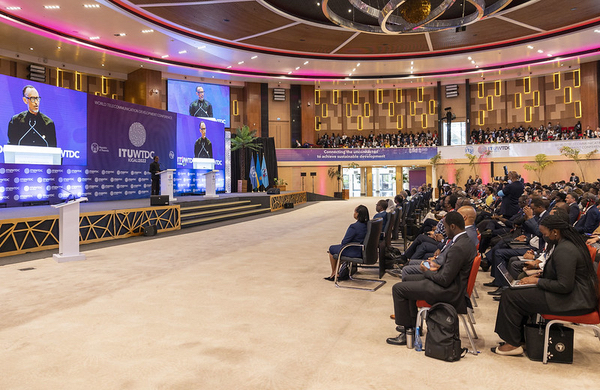
The International Telecommunication Union (ITU) today opened a landmark digital development conference aimed at bringing affordable, meaningful connectivity to the estimated 2.9 billion people worldwide who still lack an Internet connection.
Officially opening the conference, President Paul Kagame said that “In Rwanda and all over the world, the pandemic has accelerated the adoption of digital technologies but challenges remain.”
“Access to high-speed internet has not kept up with the fast pace of digital transformation, and the digitization of the economy in general,” said the President.
Adding that, “If such inequalities are left unchecked, development will accelerate more and more in some parts of the world, while elsewhere it slows down. The numbers speak for themselves. One third of the world remains offline, and the majority are women in developing countries. The responsibility to shape the future of the digital economy, and ensure no one is left behind, lies with all of us, working together.”
The World Telecommunication Development Conference (WTDC), taking place at the Kigali Convention Centre over the next two weeks, promises focused negotiations to connect the unconnected and accelerate global digital development.
The conference will produce a globally agreed Declaration and Action Plan for Connecting the Unconnected to Achieve Sustainable Development.
Under the auspices of ITU, the United Nations specialized agency for information and communication technologies, WTDC brings together more than 2,000 members of the international community, including Heads of State, government ministers, national delegations from 153 countries, prominent leaders from the digital sector, high-level representatives of regional bodies including the African Union and European Union, and top officials from non-governmental bodies.
Between 6 and 16 June, they will strive to draw up a bold new roadmap for harnessing digital technologies to drive socio-economic development and re-energize progress towards the Sustainable Development Goals (SDGs) set by the UN for 2030.
Ramping up global connectivity has gained greater urgency amid the COVID-19 pandemic of the past three years. While Internet use surged in 2020, reaching 4.9 billion users worldwide, some 2.9 billion people remain unconnected and in growing danger of being left behind.
UN Secretary-General António Guterres, addressing more than 1,000 delegates present at the opening ceremony via video message, said: “The potential of digital technologies to help us make up lost ground in our efforts to achieve the 17 SDGs is tremendous. But so too are the challenges. Over one third of humanity still has no access to the Internet…Your task is to is to map out a new Action Plan to bring the nearly three billion unconnected people into our global digital community, because leaving no-one behind means leaving no-one offline.”
Addressing key development priorities
Rwanda’s Minister for ICT & Innovation and Chair-Designate of WTDC, Paula Ingabire, told delegates gathered at the Kigali Convention Centre: “WTDC is our opportunity to conclusively address the issue of affordable and meaningful connectivity. We must mobilize ourselves to agree on urgent issues that require our consensus now, if we are to continue building foundations for a successful digital future. We can and we must take action over the next four years to ensure connectivity that enables the world’s sustainable development.”
“I echo the UN Secretary-General’s call for universal connectivity with affordable services by 2030 and hope WTDC will make headway on removing all remaining barriers to connectivity,” said ITU Secretary-General Houlin Zhao. “We have obligations to the world’s youth, and to each other, to connect the unconnected, drive the development of new technologies central to achieving the UN Sustainable Development Goals, and continue to show the world what ITU can do as a technical and, equally important, development agency.”
The Kigali Declaration and the Kigali Action Plan will set out the priorities of ITU’s Telecommunication Development Sector (ITU-D) for the next four years. To strengthen international collaboration, this 8th WTDC is placing added emphasis on new strategies to encourage commitments from both the private and public sectors to rapidly ramp up inclusive, sustainable connectivity through the Partner2 Connect Digital Coalition.
“This conference is all about mobilizing leaders from government, the global tech sector and beyond, to bring digital inclusion to even the hardest-to-connect communities and unleash the power of digital partnership to deliver on our 2030 sustainable development pledges,” said Doreen Bogdan-Martin, Director of ITU’s Telecommunication Development Bureau, which organizes the conference in support of ITU’s mandate to ‘connect the world.’
